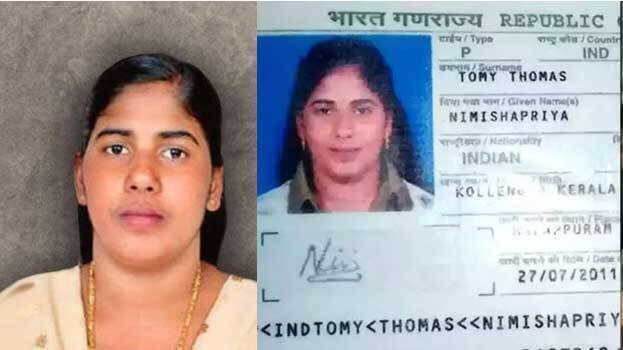In a dramatic turn of events, the execution of Nimisha Priya, a 38-year-old Indian nurse from Kerala convicted of murder in Yemen, was postponed just hours before it was set to take place on July 16, 2025. The last-minute reprieve has sparked renewed hope for her family and supporters, who are racing against time to secure her release through negotiations for a “blood money” settlement under Yemen’s Sharia-based legal system. As the world watches this high-profile case, questions linger about what comes next for Priya and how executions are conducted in the war-torn nation.
The Case: A Tale of Desperation and Tragedy
Nimisha Priya, hailing from Kollengode in Kerala’s Palakkad district, moved to Yemen in 2008 to work as a nurse, seeking better opportunities to support her family. In 2014, she ventured to establish her own clinic in Sanaa, partnering with Yemeni businessman Talal Abdo Mahdi, as required by local law. The partnership soured, with Priya alleging that Mahdi abused her, confiscated her passport, and extorted her finances, trapping her in Yemen.
In July 2017, Priya attempted to retrieve her passport by sedating Mahdi, but the dose proved fatal. With the help of a colleague, she dismembered his body and disposed of it in a water tank. Priya was arrested near the Saudi border, convicted of murder in 2018, and sentenced to death in 2020. Yemen’s Supreme Judicial Council upheld the verdict in November 2023, and President Rashad al-Alimi approved the execution in December 2024, setting the stage for her scheduled execution.
Priya’s trial has drawn criticism for its lack of fairness. Conducted entirely in Arabic—a language she does not speak—without an interpreter or adequate legal counsel, the proceedings have been labeled unjust by her supporters, including Indian Supreme Court lawyer K.R. Subhash Chandran and Amnesty International, which has called for commuting all death sentences in Yemen.
The Postponement: A Glimmer of Hope
The postponement of Priya’s execution came after intense diplomatic efforts by the Indian government and interventions by religious leaders. The Indian Ministry of External Affairs confirmed it has been in regular contact with Yemeni authorities, including jail officials and prosecutors in Houthi-controlled Sanaa, where Priya is incarcerated. The ministry has also engaged with regional powers like Saudi Arabia and Iran to influence the Houthi administration, which India does not formally recognize.
A pivotal role was played by Kanthapuram A.P. Aboobacker Musliyar, a prominent Sunni cleric known as the “Grand Mufti of India.” Musliyar reached out to Yemeni scholars, including Sufi leader Sheikh Habib Umar bin Hafiz, who is now leading negotiations with Mahdi’s family. These talks, facilitated by social worker Samuel Jerome and Priya’s mother, Prema Kumari, who has been in Yemen since April 2024, resulted in the victim’s brother, Abdelfattah Mahdi, agreeing to discuss a potential resolution for the first time.
The Save Nimisha Priya International Action Council, a group of activists, lawyers, and non-resident Indians, has raised approximately $58,000 to offer as “diyah” (blood money) to Mahdi’s family, a practice allowed under Sharia law to secure a pardon. However, negotiations remain fraught, as the victim’s family has consistently demanded “Qisas” (retributive justice), rejecting offers of compensation. Abdelfattah Mahdi expressed frustration at media portrayals of Priya as a victim, stating his family seeks “God’s Law in Qisas, nothing else.”
What Happens Next?
Priya’s fate now hinges on whether Mahdi’s family will accept the blood money and grant her clemency. Under Yemen’s Sharia-based legal system, the victim’s kin hold the ultimate authority to pardon or demand execution in murder cases. Subhash Chandran, a key member of the Action Council, emphasized that “every member of the victim’s family has to be convinced” before discussions on diyah can progress, a process he described as time-consuming.
The Indian government has stated it is exploring all possible avenues, including further diplomatic efforts through regional allies. However, the lack of formal ties with the Houthi administration complicates matters. Attorney General R. Venkataramani told India’s Supreme Court on July 14, 2025, that the government has “reached the point till which it can go,” underscoring the limited diplomatic leverage in Yemen’s complex political landscape.
Kerala Chief Minister Pinarayi Vijayan has appealed to Prime Minister Narendra Modi to intensify efforts, citing the case’s humanitarian aspects. Meanwhile, Priya’s family, including her husband Tomy Thomas and teenage daughter, remains anxious about her safety and the impact of ongoing media coverage, which could strain negotiations.
If negotiations fail, Yemeni authorities could set a new execution date, though none has been announced as of July 18, 2025. The Action Council continues to crowdfund for diyah, and supporters are urging religious leaders and the Indian public to rally behind the cause.
How Are Executions Carried Out in Yemen?
In Yemen, executions are governed by Sharia law and typically carried out in regions controlled by either the Houthi rebels or the internationally recognized government. The method of execution varies but often involves public hanging or firing squad, particularly in Houthi-controlled areas like Sanaa.
Public executions are not uncommon and are intended to serve as a deterrent. The process begins with a formal announcement from judicial authorities, followed by the transfer of the condemned to a designated execution site, often a public square. In some cases, the victim’s family is given the opportunity to carry out the execution themselves under Qisas, though this is rare. The Houthi administration, which controls Sanaa, has been known to expedite executions amid the ongoing civil war, which has raged since 2014.
Amnesty International reported that Yemen executed at least 13 people in 2021, though exact figures are hard to verify due to the country’s instability. The lack of transparency in Houthi-controlled regions and the absence of a robust appeals process often exacerbate concerns about judicial fairness.
A Race Against Time
As negotiations continue, Nimisha Priya’s case remains a poignant reminder of the challenges faced by migrant workers in conflict zones and the complexities of navigating justice systems abroad. For Priya, her family, and her supporters, the postponement offers a fragile window of opportunity. Whether it leads to her release or a tragic outcome depends on the willingness of Mahdi’s family to forgive—a decision that carries profound cultural, religious, and personal weight.
The international community, including human rights groups, continues to call for clemency, while India’s diplomatic efforts underscore the delicate balance of advocating for a citizen in a region marked by war and division. For now, Priya remains in Sanaa’s Central Prison, her life hanging in the balance as the world awaits the next chapter in this gripping saga.




































